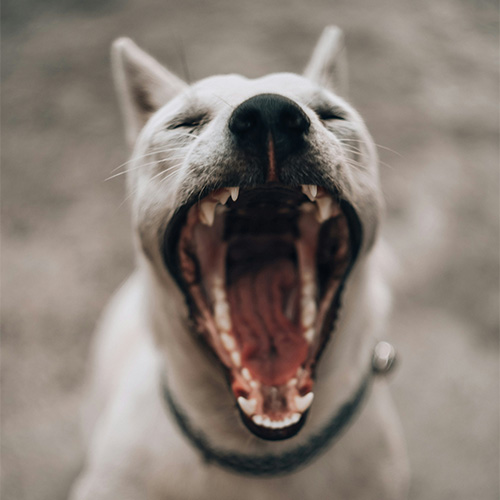


THE HOUND HUB
Smiles That Shine: The Importance of Canine Dental Hygiene
Tips & Tricks
17 April 2024
When it comes to our doggy companions, dental care is often overlooked. However, just like humans, dogs require regular oral hygiene to maintain overall health and well-being. In this article, we'll explore the significance of canine dental hygiene and provide tips on how to keep those tails wagging with healthy smiles.
The Hidden Danger:
It's easy to dismiss bad breath in dogs as "doggy breath," but foul odours can indicate underlying dental issues. Poor oral hygiene can lead to tartar build-up, gum disease, and even tooth loss. Moreover, bacteria from the mouth can enter the bloodstream, potentially causing systemic infections and affecting vital organs like the heart and kidneys. Thus, neglecting dental care not only impacts your dog's mouth but their entire body.
Preventive Measures:
Prevention is key to maintaining your dog's dental health. Start by establishing a dental care routine early in your dog's life. Regular brushing, ideally daily or at least several times a week, is the cornerstone of preventive dental care. Use a dog-specific toothbrush and toothpaste to remove plaque and bacteria effectively. Additionally, provide dental chews, toys, or treats designed to promote oral hygiene and reduce tartar build-up.
Professional Intervention:
While at-home dental care is essential, it's also crucial to schedule regular veterinary check-ups. Veterinarians can assess your dog's dental health and recommend professional cleanings as needed. These cleanings involve scaling to remove tartar and plaque build-up, polishing to smooth the tooth surfaces, and examination for any signs of dental disease. Professional dental cleanings not only freshen your dog's breath but also help prevent serious oral health issues.
Signs of Dental Problems:
Being proactive about your dog's dental health involves recognizing signs of potential problems. Watch out for symptoms such as bad breath, swollen or bleeding gums, difficulty chewing, excessive drooling, pawing at the mouth, or reluctance to eat. These signs may indicate dental issues requiring prompt attention from a veterinarian. Early detection and intervention can prevent oral health problems from progressing into more serious conditions.
Breed-Specific Considerations:
Certain dog breeds are more prone to dental problems due to factors like jaw structure or genetics. Small breeds, for example, often experience overcrowding of teeth, while dogs with smaller heads may have dental issues related to their shortened muzzle. Understanding breed-specific dental considerations can help tailor your dog's oral care routine to address their unique needs effectively.
Lifestyle Impact:
Maintaining proper dental hygiene doesn't just benefit your dog's health—it also enhances their quality of life. Imagine the discomfort of a toothache or gum inflammation for dog. By prioritizing dental care, you're ensuring that they can enjoy their favourite activities like chewing on toys or treats without pain or discomfort. A healthy mouth means a happier, more vibrant dog.
Conclusion:
In conclusion, canine dental hygiene is an integral aspect of responsible pet ownership. By prioritizing preventive measures, seeking professional intervention when needed, recognizing signs of dental problems, considering breed-specific factors, and understanding the lifestyle impact, you can safeguard your dog's oral health and overall well-being. Remember, a little effort in maintaining those pearly whites goes a long way in ensuring that your canine companion enjoys a lifetime of healthy smiles and wagging tails.
Four Paws Training always carry out a welfare check on collection and return of your dog and this includes a check of your dogs teeth and mouth.

For more information on how we can help, please contact us using the form below:
For more information on how we can help, please contact us using the form below:
